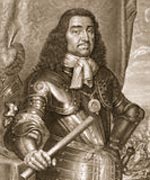George Monck

Første hertug af Albemarle. General i den engelske hær på Cromwells side. Senere officer i flåden.
- Dunbar II, 1650
- Worcester, 1651
- Portland, 1653
- North Foreland I, 1653
- Texel I, 1653
- Dover-strædet, 1666
- North Foreland II, 1666
George Monck,
the son of a baron, was born in Devon 1608. Monck became a professional
soldier and on the outbreak of the Civil War he joined the forces supporting
Charles I. Monck was captured at the Battle of Nantwich in 1644. He was
imprisoned in the Tower of London for two years and in 1647 agreed to
become a commander in the Parliamentary army. Monck successfully fought
in Ireland and Scotland before taking part in the Dutch Wars (1652-54).
On
3 September 1658, Oliver Cromwell died. A few months previously, Cromwell
had announced that he wanted his son, Richard Cromwell, to replace him
as Lord Protector of the Commonwealth. The English army was unhappy with
this decision. While they respected Oliver as a skillful military commander,
Richard was just a country farmer. In May 1659, the generals forced Richard
Cromwell to retire from government. Parliament and the leaders of the
army now began arguing amongst themselves about how England should be
ruled. Monck, now the officer in charge of the English army based in Scotland,
decided to take action, and in 1660
marched his army to London. When
Monck arrived he reinstated the House of Lords and the Parliament of 1640.
Royalists were now in control of Parliament. Monck now contacted Charles
II, who was living in Holland. Charles agreed that if he was made king
he would pardon all members of the parliamentary army and would continue
with the Commonwealth's policy of religious toleration. Charles also accepted
that he would share power with Parliament and would not rule as an 'absolute'
monarch as his father had tried to do in the 1630s. This information was
passed to Parliament and it was eventually agreed to abolish the Commonwealth
and bring back the monarchy. As
a reward for his action, Monck was granted the title, the Duke of Albemarle
and was appointed as lieutenant-general of the army. He also became one
of the king's most important advisers. Many
of the men who had fought as Cavaliers against the Roundheads also became
ministers and advisers. Some of these men wanted revenge against those
who had killed their king. A large number of the people responsible were
now dead. However, many of those who were still alive were punished. Eleven
members of the House of Commons who had signed Charles I's death warrant
were hanged, drawn and quartered. Royalists even dug up the body of Oliver
Cromwell and displayed it at Tyburn. Although
he was a Presbyterian Monck made no effort to prevent the Anglicans from
regaining power. He kept out of politics and served in the army during
the Second Dutch War (1665-67). George Monck died in 1670 and was buried
in Westminster Abbey, London.